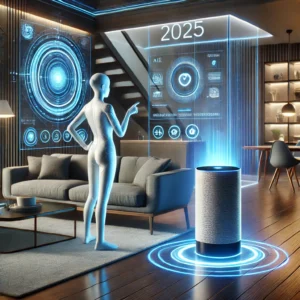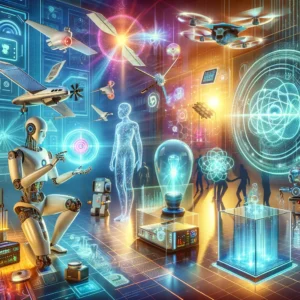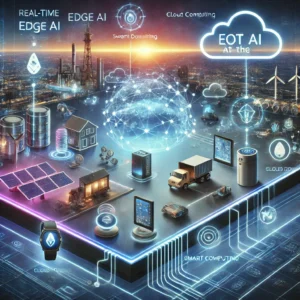How AI Is Shaping the Future of Personal Assistants in 2025

How AI Is Shaping the Future of Personal Assistants in 2025.
Discover how AI is shaping the future of personal assistants in 2025. Explore advancements, key features, and industry applications of AI-powered assistants.
Artificial Intelligence (AI) has transformed countless aspects of our lives, and personal assistants are no exception. From streamlining daily tasks to offering unparalleled convenience, AI-powered personal assistants are becoming indispensable. As we navigate 2025, these virtual companions continue to revolutionize how we live and work.
The Evolution of AI in Personal Assistants
AI technology has come a long way since the inception of basic voice-activated tools like Siri and Alexa. In 2025, AI personal assistants are more intuitive, adaptive, and capable of handling complex tasks seamlessly. This evolution is driven by advancements in machine learning, natural language processing (NLP), and cloud computing.
1. Enhanced Understanding of User Behavior
AI assistants now leverage behavioral analysis to anticipate user needs. By analyzing past interactions, search patterns, and preferences, they provide personalized recommendations tailored to individual lifestyles.
2. Conversational Intelligence
Thanks to breakthroughs in NLP, AI assistants in 2025 are capable of engaging in human-like conversations. They understand context, tone, and intent, making interactions more natural and productive.
3. Integration Across Platforms
AI assistants are now integrated across multiple devices, from smartphones and smartwatches to home automation systems and vehicles. This interconnected ecosystem ensures a seamless user experience.
READ ALSO: The Impact of Tech on Traditional Education Systems.
Key Features of AI Personal Assistants in 2025
Voice and Visual Interaction
Gone are the days of purely voice-based interactions. AI assistants now incorporate visual interfaces like holograms and augmented reality (AR), offering users a more immersive experience.
Multilingual Support
In 2025, AI personal assistants can fluently communicate in multiple languages, breaking down language barriers and catering to global users.
Proactive Task Management
Modern AI assistants proactively manage tasks such as scheduling, reminders, and even automating recurring errands like grocery orders or bill payments.
Health Monitoring
With integration into wearable devices, AI assistants track health metrics like heart rate, sleep patterns, and activity levels, offering real-time insights and suggestions for healthier living.
Security and Privacy
Enhanced encryption and biometric authentication ensure that user data remains secure, addressing one of the most significant concerns surrounding AI adoption.
—
Industries Leveraging AI Personal Assistants
1. Healthcare
AI assistants streamline patient care by scheduling appointments, reminding users to take medications, and even providing first-aid advice through connected devices.
2. Education
Students benefit from AI tutors that offer personalized learning experiences, helping them grasp complex topics with ease.
3. Business
Professionals rely on AI assistants for managing calendars, conducting virtual meetings, and generating reports, improving productivity and efficiency.
4. Hospitality
Hotels and restaurants use AI assistants to enhance customer experiences, from booking reservations to providing concierge services.
—
Challenges in the AI Personal Assistant Space
While the advancements are impressive, there are challenges to overcome:
1. Data Privacy: Striking a balance between personalization and data security is paramount.
2. Bias in Algorithms: Ensuring fairness and inclusivity in AI responses remains a concern.
3. Over-reliance on Technology: Excessive dependence on AI can reduce critical thinking and problem-solving skills.
—
The Future of AI Personal Assistants Beyond 2025
Looking ahead, the potential of AI personal assistants seems boundless. Emerging technologies like quantum computing and generative AI will likely take these tools to the next level. We may soon witness assistants capable of creative problem-solving, emotional intelligence, and even autonomous decision-making.
—
How AI Personal Assistants Impact Daily Life in 2025
Time Efficiency
AI assistants help users save time by handling mundane tasks, allowing them to focus on what matters most.
Improved Accessibility
With advancements in AI, these assistants cater to individuals with disabilities, providing tools for communication and daily activities.
Cost Savings
Automating routine tasks and optimizing energy consumption in smart homes contribute to significant cost reductions.
—
Encouraging Responsible AI Use
To fully harness the benefits of AI personal assistants, responsible use is essential. Users must stay informed about data practices, update privacy settings regularly, and explore ethical AI options from reputable providers.
—
Conclusion
AI personal assistants in 2025 represent the pinnacle of convenience, adaptability, and intelligence. By reshaping industries and enhancing daily life, they are not just tools but indispensable partners in navigating the complexities of modern living. As we embrace these innovations, the key lies in balancing technological advancements with ethical considerations to ensure a future where AI truly serves humanity.




